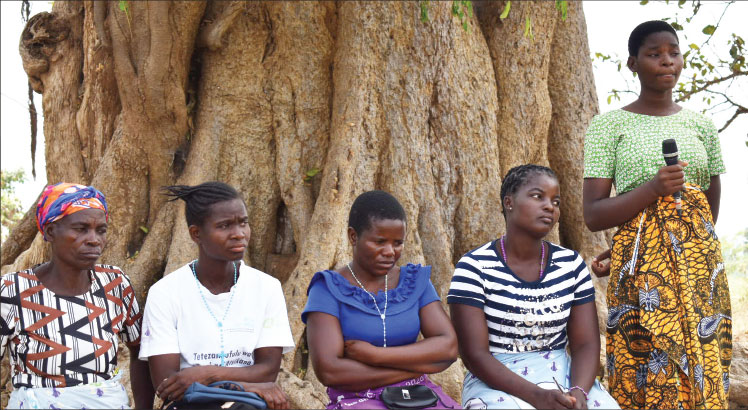When her 14-year-old daughter fell pregnant in 2019, Hilda Chipala of Mussa Village in Balaka forced her to instantly marry the young man who impregnated her.
This is not an unusual reaction in most Malawian families when daughters fall pregnant.
“I had nothing to do with her,” she states. “I dropped her at the boy’s home for marriage.”
Chipala says she was heartbroken and angry with her pregnant daughter, Tadala, then in Form Two at Phalula Community Day Secondary School.
“What hurt the most was that I realised this a month after I had struggled to pay her Junior Certificate of Education examination fees,” she recounts.
In a country with deep-rooted taboos and misconceptions about sex, girls give in to peer pressure and parental force to marry too young.
Ethel (standing) speaks during a community action group meeting
Some of them are exposed to early unprotected sex debuts, fueling teen pregnancies, child marriages and sexually transmitted infections, including HIV.
The Malawi Demographic Health Survey of 2015 shows that nearly half of girls in Malawi marry before their 18th birthday and a third become mothers before reaching 19.
Tadala’s situation shattered her mother’s hopes of having an educated girl child.
“My other two girls got pregnant and dropped out while in primary school. I was hopeful Tadala will finish school to be empowered physically, mentally and economically, among others, but came the pregnancy to mess the plan,” says the mother of five.
Two weeks after dropping Tadala into the marriage, members of Mussa Star Circle visited Chipala and persuaded her to reverse the decision.
The 53-year-old woman says: “They pleaded that I give Tadala a second chance to go back to school after giving birth to pursue her dreams of becoming a nurse, informing me that the marriage violates her rights and is an abuse.”
The star circle initiative being implemented by Oxfam and Women’s Legal Resources Centre (Wolrec) to help communities understand and promote the rights of women and girls.
Among others, the members of the circle discuss challenges and ways to eliminate violence against women and girls in the area.
Chipala, who takes care of her seven-member family through income from piecework in the neighbourhood, took back Tadala under her wings again until she gave birth.
She is one of the 560 girls withdrawn from marriages and re-enrolled in schools since 2019 in the area.
Chipala could babysit her grandson and provide necessary support to Tadala to attain education.
Though she did not become a nurse, Chipala is proud of her daughter for completing secondary school education.
“Tadala is now employed at a small firm in Blantyre where she earns money to support her son and the family back here. This is what I wanted and I am thankful to the star circle for the enlightenment back then,” she says with a smile.
Activist Victoria Jafali, from Kavala Community Action Group that oversees activities of Mussa Star Circle, says they are safeguarding girls’ rights to break the vicious circle of poverty in the area.
“We engage communities to understand the importance of educating a girl child. Educated girls are empowered and earn more income to support their families. We are against child marriages as they hinder children’s potential. We moved in quickly to get Tadala out of such marriage, and returned to school a lot of other girls,” she says.
It is in the same spirit that in 2020 members of Kanyimbo Community Action Group in T/A Phimbi had to travel to Lunzu in Blantyre to terminate a marriage involving Ethel Peter, 15.
She had just passed her Primary School Leaving Certificate of Education examinations.
Ethel blames poverty for going into child marriage.
“There was no hope I would continue with my education. My two sisters failed to go to secondary school before because of lack of fees. It was clear with me again that my physically challenged father could not afford my fees,” she states.
Peter Simon, her father who weaves mats for sale, says it is hard to raise income even for two meals a day for his seven-member household.
“It is K1 000 a mat and people do not buy daily. Life has been a struggle, and even with little income from my wife’s piecework we fail to support ourselves, including meeting children’s education needs,” says the 52 year-old man.
Kanyimbo Community Action Group chairperson Alex Chiphathi says the members resorted to contributing for Ethel’s school needs.
“It is the communities’ responsibility to ensure she stays in school and gets necessary holistic support to complete her secondary education,” he says.
Ethel, who wants to become a police officer, is in Form Two at Njerenje CDSS.
Simon appreciates the initiative for helping her third born daughter to grow into a proactive citizen.
Ethel is among 811 girls sent back to school from the 1 521 dissolved child marriages in the area
Group Village head Mkwezalamba is certain of sustainable development in his area with the intervention.
He also developed child protection by-laws to complement efforts to keep girls in schools.
“The community awareness on rights and embracing of measures to eliminate abuse are promoting welfare of women and girls. I have banned harmful cultural practices to empower females to live to their full potential,” he says.
UN Women funded project through UN Trust also equipped communities with capacity to demand for easy access to basic services from duty bearers.
Long walks to collect water perpetuated violence against women and girls. Women could be beaten by their husbands suspecting them of cheating after spending many hours collecting water. The long trips to water sources also exposed girls to sexual violence and report late for classes or be absent from school.
Now there are boreholes near homes in the villages, and bridges to ease mobility among other demanded projects that liberate women and girls to have more time for development activities.
Wolrec’s project officer Ernest Mujavo says they strive to promote girls’ rights to sustainably curb violence against women and girls.
He says: “We are delighted with the strides registered in empowering women. Educated girls cannot marry young. They will ensure their daughters become educated too, thereby, reducing child marriages in the long run.
“We also engage women in income generating activities that allow them to curb debilitating poverty and social exclusion.”
The post Keeping girls in school appeared first on The Nation Online.
 Moni Malawi
Moni Malawi 
